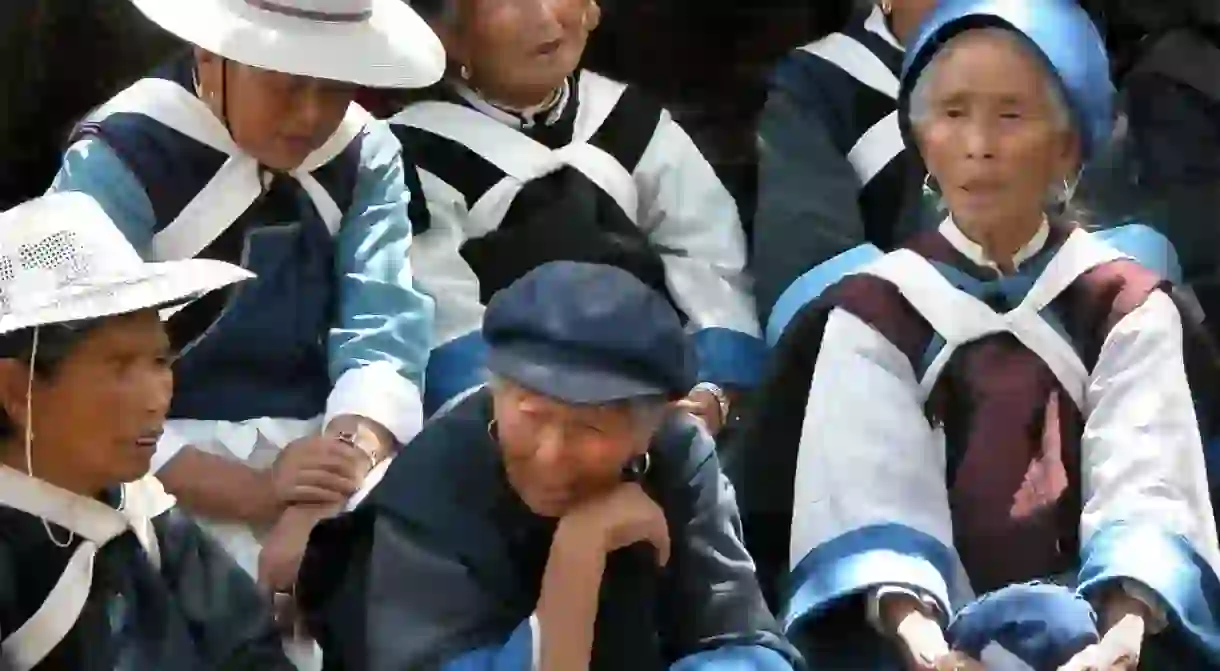An Introduction to China's Nakhi People

The Nakhi, also called the Naxi or Nashi, are a small clustered group of people located primarily in China’s southern Yunnan province. They number just above 300,000 and have drawn international fascination for their matriarchal society in which the women work the farms, as well as take care of the household.
Homeland
Today, the majority of the Nakhi live at the juncture of the Yunnan, Tibet, and Sichuan provinces, with the idyllic Yunnanese town of Lijiang serving as their central location. Since Lijiang’s designation as a UNESCO World Heritage Site in 1997, many of the local Nakhi people have moved away from the old town and rented their houses to shops and cafes. However, the town remains a living memorial to the incredible lives of its former inhabitants.
Due to their strategic positioning, the Nakhi long served as the middlemen on the Tea Horse Road. As the name suggests, the ancient road was the land route along which tea was transported from China to South Asia. The Nakhi did not do the transporting themselves, but instead used their seat in Lijiang to set the rules of the trade and barter for goods as they came through.

History
It is believed that the Nakhi are descendants of the archaic Qiang people (not to be confused with the Qiang who still exist today). Sometime during the Han dynasty, the Nakhi were pushed south to the fertile Baisha and Lijiang areas. There a geographic split separated the group into three: the Nakhi themselves, who remained in Lijiang; the Bai, who went on to inhabit Dali; and the Mosuo, who are often confused with the Nakhi as they live nearby and call themselves the Na.
For centuries the Nakhi subsisted on livestock breeding, but during the tenth and thirteenth centuries they switched over to agricultural production, which turned out to be much more profitable for the group. Soon, the wealthiest among them became feudal lords, some of them even owning slaves.
During the Yuan dynasty, Lijiang was established as the seat of the Yunnan imperial court, and during the subsequent Ming dynasty, local chieftain Mude was put in charge of all regional ethnic groups. The Mu clan also served as tax collectors for the Ming court and retained power until an eventual fall from prominence in the latter half of the Qing dynasty.
Throughout their history, the Nakhi culture has changed minimally, with influences from Buddhist Tibet and Han China being integrated seamlessly into their own traditions.

Culture
Perhaps the most fascinating aspect of the Nakhi is their adherence to a matriarchal society. The women have traditionally shouldered all manual labor and are said to be “stronger and more capable than ten horses.” Family lines are also matrilineal, meaning that inheritance is passed down from the mother’s side. The men are not without their function, though. In addition to caring for the children, some also practice falconry, a dying Chinese tradition that the Nakhi are helping to preserve.
The Nakhi language is in the same family group as Mandarin, but is unique for its pictographic writing system (one of few such systems still in use today). The Nakhi pictographic system is called Dongba and is unfortunately dying, since it was largely replaced by the Geba syllabic script in 1957.
One of the primary ways in which the Nakhi have integrated Tibetan and Han cultures into their own is through religion. Today, most Nakhi identify as either Tibetan Buddhist or Taoist.
Nakhi music also helps identify this vibrant ethnic group. Traditionally, males of honorable backgrounds were allowed to play in Dongjing orchestras, which combined the muyu, pipa, sugudu, sanxian, reed pipe, gugin, and guzheng instruments. Participation was often hereditary, and accomplished performers were considered to have high standing within the community. Since the Communist takeover in 1949, the playing of Dongjing has become much less strict.














